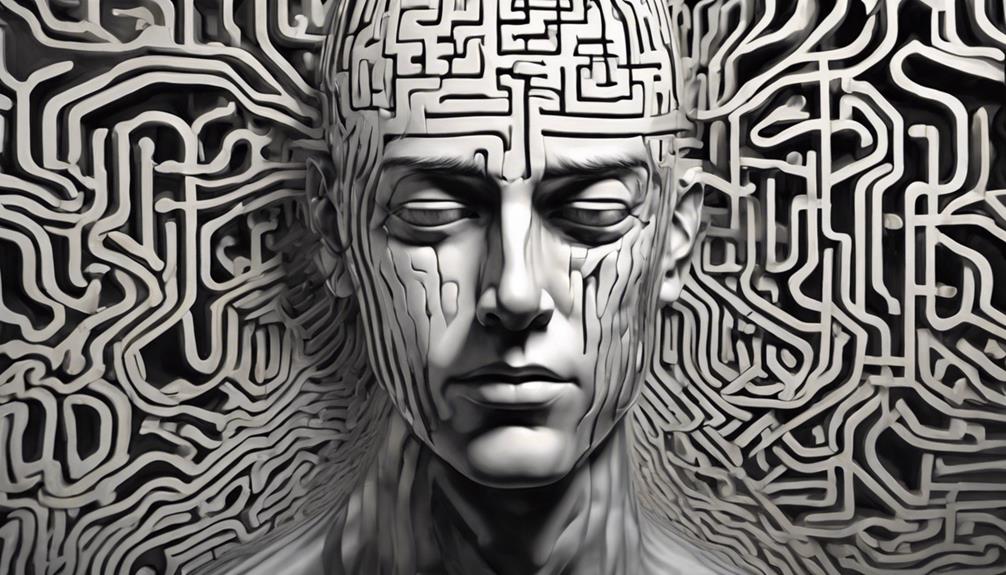When exploring the complexities of relationships, it is intriguing to see how a seemingly straightforward choice can lead to unforeseen consequences.
In the realm of divorce, the aftermath for a narcissist can be a tumultuous journey. When a narcissist regrets the end of their marriage, it unravels a web of emotions and behaviors that offer a glimpse into their psyche.
The layers of remorse they experience shed light on a deeper narrative that is both intriguing and perplexing, inviting us to unravel the intricacies of their regret in the context of their narcissistic tendencies.
Key Takeaways
- Narcissists struggle with the loss of control and validation after divorce.
- Signs of narcissist's regret include emotional growth and attempts to reconnect.
- Coping strategies for regret involve therapy, self-reflection, and surrounding oneself with support.
- Moving forward post-divorce includes establishing boundaries, self-care, and rebuilding life at own pace.
Narcissistic Remorse After Divorce
Narcissists experiencing remorse after divorce may struggle to reconcile their need for validation with feelings of loss and abandonment. The internal battle between their insatiable desire for admiration and the harsh reality of separation can lead to a profound sense of regret. Despite their outward display of confidence, deep down, narcissists may harbor regrets about losing a source of narcissistic supply. This regret can stem from the fear of being alone and the realization that their ex-spouse was a crucial part of their self-image. The pain of rejection and abandonment can be overwhelming for individuals with a narcissistic personality disorder.
As they navigate through the aftermath of a divorce, narcissists may seek new relationships to fill the void left by their previous partner. These new connections serve as a way to reaffirm their self-worth and regain the validation they crave. However, this cycle of seeking external validation may be a temporary fix, as true introspection and growth are essential for healing from the regret of losing a significant relationship.
Reasons for Narcissist's Regret

Feeling a mix of relief and newfound freedom, some individuals with narcissistic tendencies may experience regret following a divorce as they navigate through a complex array of emotions and motivations. Understanding the reasons behind a narcissist's regret can shed light on their inner turmoil and conflicting thoughts. Below is a table highlighting key factors contributing to a narcissist's regret after a divorce:
| Reasons for Narcissist's Regret |
|---|
| View divorce as loss of control and power over former spouse |
| Fear of losing source of admiration and attention |
| Exposure of flaws and vulnerabilities |
| Realization of inability to manipulate former spouse for validation |
| Threat to sense of entitlement and superiority |
Navigating the aftermath of divorcing a narcissist can be challenging. Seeking support from a family law attorney or a divorce lawyer can provide guidance and legal expertise. Recognizing red flags early on, such as excessive self-absorption and manipulation, can help individuals protect themselves from falling into unhealthy relationships in the future. Remember, taking care of oneself emotionally and seeking professional help is crucial when dealing with a narcissistic ex-partner.
Signs of Narcissist's Regret
After recognizing the reasons behind a narcissist's regret following a divorce, it's crucial to identify the telltale signs that may indicate their internal struggles and coping mechanisms.
- Increased Emotional Growth: Despite their facade, a narcissist may start showing signs of emotional growth, acknowledging their faults and seeking self-improvement.
- Getting Caught in Vulnerable Moments: When alone or in unguarded moments, a narcissist might display genuine emotions that hint at regret and longing for what was lost.
- Uncharacteristic Text Messages or Communication: They may send texts expressing remorse or attempting to reconnect, showing a crack in their armor of indifference.
- Acknowledging Loss of Control: If a narcissist starts to recognize and vocalize the loss of control over the situation, it could be a sign of underlying regret for the divorce.
Coping Strategies for Regret

To effectively cope with feelings of regret following a divorce, it's important to acknowledge and accept these emotions as a natural part of the healing process. When dealing with the aftermath of a narcissistic divorce, it's crucial to practice self-compassion and avoid blaming oneself for the decisions made.
Seeking therapy or counseling can be beneficial in processing and working through these regrets in a healthy manner. By focusing on personal growth and self-improvement, individuals can use their regrets as motivation to make positive changes in their lives.
Surrounding oneself with a supportive network of friends and family who provide understanding and encouragement is also key. Taking responsibility for one's actions and choices, practicing self-reflection, and forgiving oneself for past mistakes are important steps in coping with regret.
Moving Forward Post-Divorce
Acknowledging and accepting the emotions that come with divorce is crucial in moving forward post-divorce, especially when dealing with the aftermath of a narcissistic relationship. When going through a divorce with a narcissist, it can be particularly challenging, but there are steps that can help provide some clarity and direction:
- Seek Support: It's essential to surround yourself with a strong support system of friends, family, or a therapist who can help you navigate the healing process.
- Set Boundaries: Establishing healthy boundaries with your ex-spouse is crucial to protect your well-being and prevent further manipulation.
- Focus on Self-Care: Taking care of yourself both mentally and physically is vital. Invest time and energy in activities that bring you joy and promote self-growth.
- Personal Pace: Remember that moving forward after divorce is a personal journey. It's okay to take things at your own pace and focus on rebuilding your life in a way that feels right for you.
Frequently Asked Questions
How Does a Narcissist Feel After Divorce?
After a divorce, we may experience a range of emotions, including relief, freedom, and a sense of control.
It's common for us to quickly move on to new relationships, minimizing the significance of the divorce. We may view it as a failure on our ex-spouse's part, rather than reflecting on our own behavior.
Our lack of reaction could be a defense mechanism to protect our image and avoid vulnerability.
Do Narcissists Regret Leaving Their Wife?
We understand the complexity of relationships and the myriad of emotions that can accompany them.
When it comes to leaving a spouse, it's crucial to consider the unique dynamics at play. Various factors can influence a person's feelings and decisions during such a significant life event.
Do Narcissists Win in Divorce?
We believe that in divorce, narcissists often strive to 'win' by manipulating situations to their advantage. They may seek to control the narrative, financial outcomes, and even the emotional well-being of their ex-partner.
Their actions can be driven by a desire for power and validation, rather than genuine concern for fairness or mutual benefit. This approach can lead to a contentious and one-sided resolution, where the narcissist prioritizes their own needs above all else.
Why Do Narcissists Drag Out Divorce?
We find that narcissists drag out divorces to maintain power and control over their ex-partner. They prolong the process to manipulate and punish their former spouse, continuing to exert influence over their emotions and life.
This behavior allows narcissists to delay facing their own feelings of failure and loss, while also enjoying the drama and chaos that a prolonged divorce brings. Ultimately, it serves as a tool for them to assert dominance and inflict emotional distress.
Conclusion
In conclusion, navigating narcissistic regret after divorce requires resilience and reflection. Recognizing the signs of remorse and implementing coping strategies can help in moving forward.
Though challenging, embracing change and growth post-divorce is key. Remember, resilience reigns, regrets recede, and renewal awaits.











